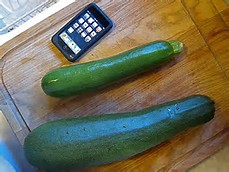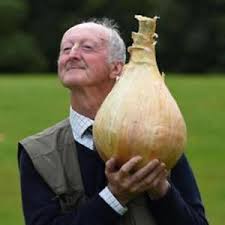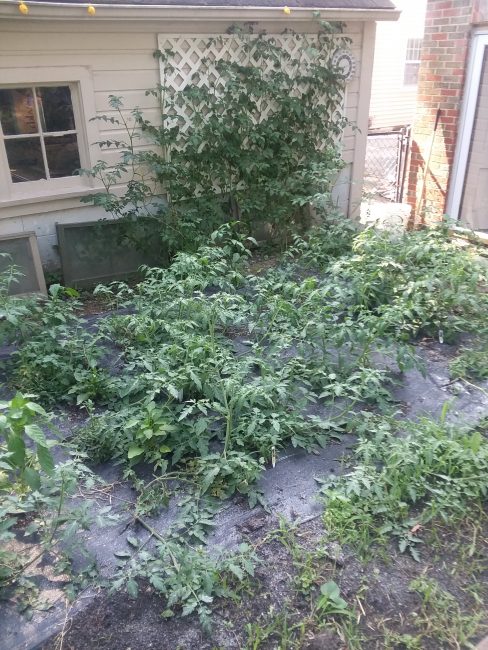When to Pick: The Tao of Harvesting Vegetables and Fruits

One thing that is overlooked by gardeners is when to harvest vegetables.
Obviously, we should wait wait until the vegetable is ripe, but that means different things to different people. Take squash for example. When is squash ready to pick? A yellow squash is ripe when it is about 6 inches long, but we all know that if we let that tiny squash go, it will continue to get bigger and bigger. And bigger is better, correct? Not so much.
Once a vegetable is ripe, it should be picked immediately. Many people make the mistake of not picking a vegetable until they have a use for it (like, I’m planning to make a squash dish next Thursday), but gardeners need to try to get out of that habit. Vegetables should be picked when they are ready, which is as soon as they are ripe.
There are many reasons we should pick as early as possible, and the most important one is that smaller vegetables taste much better. In truth, you need to pick that squash as soon as it is ripe and no later. Cook the squash dish today. We have to adjust our eating of the harvest around the harvest.
If you don’t believe this, test it out by picking a zucchini extremely early, then one a little later, and so on, and see what the difference is in taste. The best way to check for optimal flavor is to taste your vegetables raw…slice a piece off and see how much flavor it has.

As gardeners, we spend so much time working on growing the plants, yet we sometimes treat harvesting as an afterthought. Although we have worked so hard to make the perfect organic vegetable, if we don’t pick it at the right time, we have wasted all of that hard work.
One mental guide that I like to follow is that if I think something is ripe, I just pick it, period. I then try it see it to see if it tastes good. This sounds elementary, but many gardeners have not ever done this. We are afraid to pick things. The average gardener picks their vegetables way too late.
Another reason that we hesitate to pick a vegetable is that we think the plant will only produce so many of them. If my squash plant is only going to produce 5 individual pieces of squash in total, than I had better wait until they are really big so that I can show everyone how great my harvest is.

But this thinking is wrong. If I pick a squash as soon as it is ripe, the plant is actually inclined to produce more. Why?
Because it is in the plant’s nature to make sure that before it dies, it produces as much seed as possible to ensure that it lives on in future years.
Picking vegetables (or fruit) does not reduce the amount of production a plant puts off — and in fact, it can increase the production.
If I am a plant, and an animal keeps eating my offspring as soon as it is ripe, what am I going to do? I am going to amp up production. And this is exactly what a plant does. And seasoned gardeners know this.
Even if I can’t use the produce, I should pick it today, when I know that it is ripe…even if I have to throw the ripe produce into the compost bin! That’s a hard lesson to swallow, but give it a try. Heck, extra produces is fun to give away to people or even sell in your local farmer’s market.
Try this experiment: for one squash plant (plant A) pick as early and as often as you can and record the total weight of the produce until the plant dies. Then, on another squash plant (plant B) wait for as long as you can and pick the produce when it is as large as possible.
You may find that not only did you get better quality from Plant A, but that you got more produce from it. And that is the secret to harvesting, regardless of the vegetable or fruit.
Often in gardening, we need to do things that don’t seem intuitive at first. The great thing about permaculture-style gardening is that we have so many plants going at the same time, we can afford to try “crazy” things like picking way too early, and in that way, we can learn so much more about gardening.
Here’s another “crazy” thing that we do. For some plants, we don’t pick anything at all. We let the whole plant do its thing from start to finish and never harvest anything from it. Why?
Because in doing so, you may find that next year, you don’t even have to plant squash at all. By letting some plants go to seed, you can effectively convert the crop into a pseudo-perennial. Don’t harvest everything!
I never have to plant tomatoes again, unless I want different varieties or want to rotate them to a different section of the property. It’s because I don’t pick them all, and the fruit falls to the ground, rots, and reseeds itself for next year.

Pro Tip: My Step-father “Willie” also follows our permaculture-style organic gardening method. He makes tomato sauce to die for using this hand crank food mill that effortlessly removes the skins and seeds from tomatoes. He cranks through scores of tomatoes outside and then throws the seed and skin pulp right back into the garden where he wants tomatoes to come up next year. He gets so many that he has to pull some out for the compost bin!
In permaculture, we try to mimic nature, so long as it suits our goals, and “nature” picks stuff early (think birds on fruit) but it also leaves stuff alone sometimes.
When I think about harvesting, another point that comes to mind is plant stress. The squash plant that I picked the sh#it out of actually gave me more produce and better produce. This is a theme that, if one pays attention to, repeats itself over and over again in the garden.
There is a whole science that is cropping up (pun intended) that is analyzing plant nutrition, and scientists are starting to report that plants that have had a hard life are actually more nutritious than plants that have been “pampered.” We’ll have another article on this topic, but a seasoned gardener gets the feeling that this is probably true. Pruning is another skill that we often are hesitant about, but which really makes sense sometimes, but more on that at a different time.
The gist of it is that plants can’t physically move or walk away from things that threaten them and, because of this, over the millennia, they have come up with ways to get around challenges. When stressed, many of these “ways” can actually benefit humans.
For example, a squash plant that has had the time of its life may be satisfied with dropping the normal offspring, but one that has had to deal with adversity may produce something that is a little more potent…its last chance to ensure its legacy.
Whether you believe this or not, it is nevertheless important to be mindful and observant in the garden, and harvest time is certainly no exception.
If I were to reduce the concept of Permaculture down to a single word, it would be “observation.” Check out what’s going on in your garden and try stuff, and then see how it goes. Pay attention.
Also, the next time you are at the produce counter, please don’t buy the biggest thing. Try buying the smallest thing. As the French chef Jacques Pepin would say, “Tiny potato is better.”
Thanks for reading, and please share this article if you found it helpful.